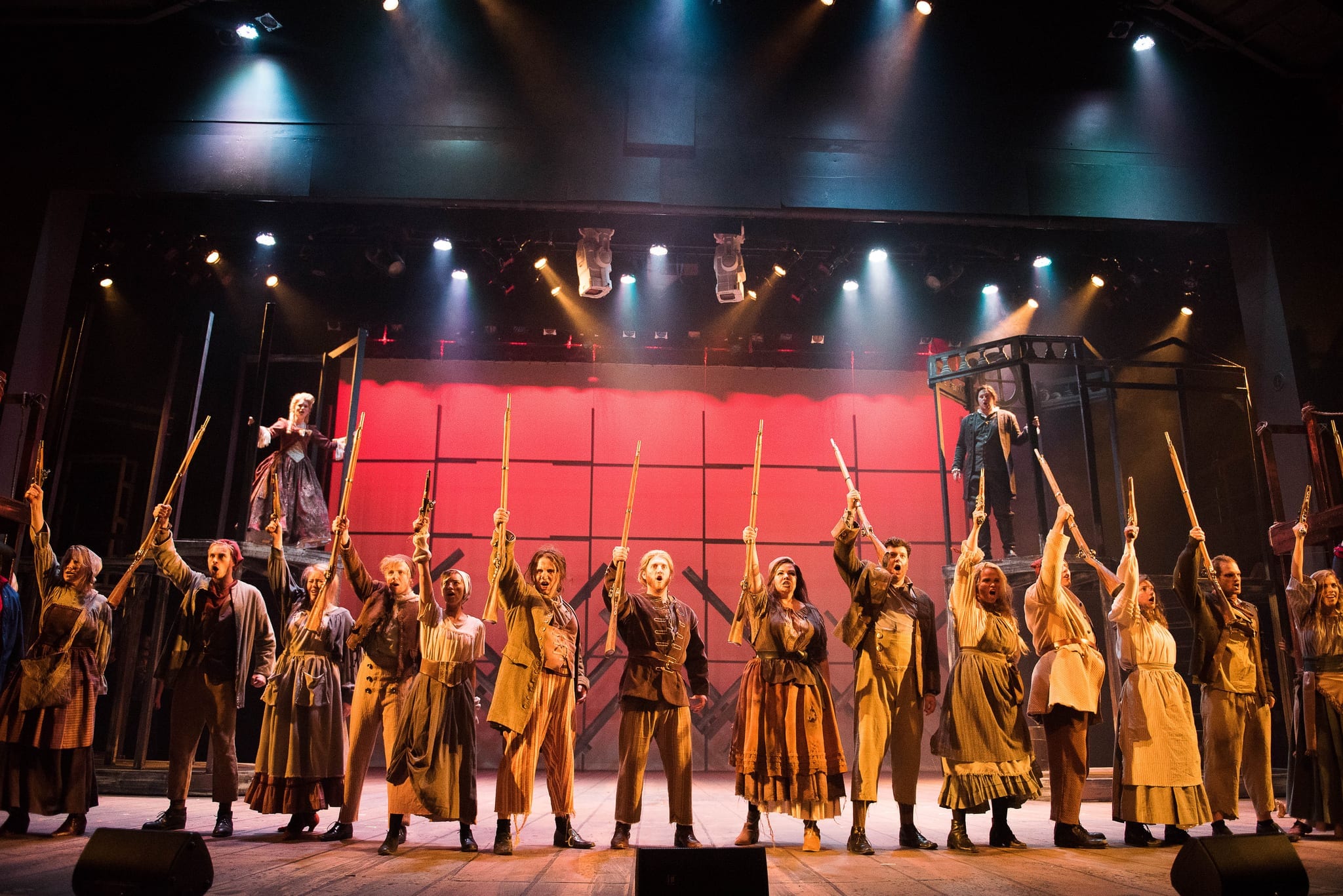CENTERVILLE — A Tale of Two Cities is a musical adaptation of the famous novel by Charles Dickens that tells of the life and challenges of several people living before and during the French Revolution. This adaptation has a book, music, and lyrics by Jill Santoriello, and the current CenterPoint Legacy Theatre production was directed by Scott Montgomery. The story centers around Dr. Mannette (played by David Weekes), who was captured and tortured for 17 years in France, his daughter Lucie (played by Sarah Jane Watts) and the two men that love her: the honorable French aristocrat Charles Darnay (played by Christian Lackman) and the bitter but honorable alcoholic Sydney Carton (played by Taylor Smith). The novel famously opens by stating that, “It was the best of times and the worst of times,” and the stage version seems poignant today.

First, the very strong aspects of the production should be mentioned. The set, designed by Scott Van Dyke, was intricate and impressive. Three moveable sections worked to serve as the poor streets of London and Paris, the inner chambers of a rich home of the Marquis St. Evremonde (played most amusingly by Matt Green), and the miserable barricades and gallows of the French Revolution, among many other locations. This ability for these set pieces to be so interchangeable yet still provide the appropriate ambiance was visually astute. Costuming by Tammis Boam and makeup and hair by Hope Bird were equally impressive.
The cast did an astounding job singing the score, and the vocal and music direction by Marcie Jacobson was evident throughout the production. The blend of the chorus members’ voices was just as lovely as the power of the leads, and all made for a musically pleasant evening. There were many standout performances, including Carissa Klitgaard as Madame Therese Defarge, a member of the French Revolution whose tragic familial past leads her to lament the challenges facing her and the people of France. The number “Out of Sight Out of Mind” combined magnificent vocal skill with the emotion and pain of the time to showcase a masterful performance that Klitgaard continued throughout the show. Weekes also captivated me with his strong vocals and impressive understanding of the emotions of the story. From the emotional prologue, “The Shadows of the Night,” to the sweet and tender moments with Watts as Lucie in “Who You Are,” Weekes held solid in his characterization and performance.

As sinister comedic relief, the characters of Cruncher (played by Tyler Hanson), Barsad (played by J. R. Moore), and Green as the Marquis all added needed humor to a production so full of deep and dark material. What impressed me further was some of the more sensitive and emotional moments from both Hanson and Moore, played with enough realistic flavor to still remain in character, but to also show the humanity found in most characters. As the two lovers Lucie Mannette and Charles Darnay, Watts and Lackman had great chemistry and provided an idealistic look at love that grows as the story progresses. They displayed the kindness that is essential in strong, loving relationships. Watts had a great ability to portray genuine care for those in the story, and that reflected in all her interactions. Lackman was also impressive vocally, and managed to gain sympathy for the challenges he faced with his family in France and his new family with Lucie.

The true standout in the show, both from story perspective and acting prowess was Smith as Sydney Carton. It is a difficult feat to play a role that begins with bitterness and contempt for most of humanity, and yet becomes the main, selfless, heroic crux of the story. Smith was aptly cast, and many of his moments, from his first solo, “Reflection,” to the truly most beautiful moment of the production, the very ending monologue, showed the strength of this young actor.
After all the accolades, it should be noted that Santoriello’s script and music are rather cumbersome, with the first act being entirely too long. The entire show tries a bit too hard to mirror other more popular musicals, especially Les Misérables. The ending of the first act, “Until Tomorrow,” and the amusing pub song “No Honest Way” are shockingly similar to songs from other shows. This cast, crew, and production team wer obviously very talented, and while aspects of the performances and the show were amazingly strong, the script, music, and lyrics remained a downfall of this—and any—production of A Tale of Two Cities.
[box]A Tale of Two Cities plays at CenterPoint Legacy Theatre (525 North 400 West, Centerville) nightly (except Sundays) at 7:30 PM and on Saturdays at 2:30 PM through October 28th. Tickets are $14-26. For more information, visit www.centerpointtheatre.org.[/box]
